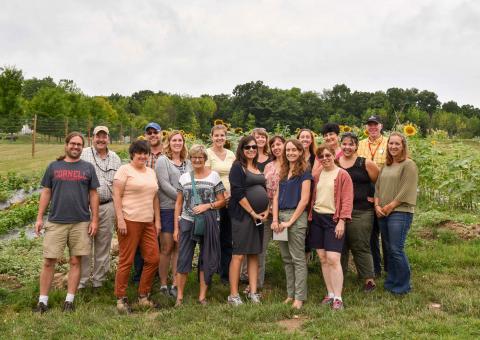Extension educators make ag development connections
By R.J. Anderson

While the consumer appetite for locally produced foods is at an all-time high, not all farmers have mastered how to access all-important distribution and delivery systems. For many, growing the commodities is the easy part. Getting their product into important retail outlets such as Wegmans can be another story.
To help bridge that gap, the Cornell Cooperative Extension Agriculture and Community Development program work team recently hosted a two-day workshop for CCE educators and other agriculture support entities who work with mid- to large-scale producers across New York state. The program was spearheaded by a trio of CCE agricultural economic development specialists: Harvest New York’s Cheryl Thayer; CCE Ontario’s Marie Anselm; and CCE Broome’s Laura Biasillo, who also co-chairs the program work team.
Sessions – held at a number of venues in and around Rochester and Geneva, including the Wegmans Organic Farm, Swiftwater Brewing Co., Pioneer Malting and McCann’s Local Meats – covered expanding opportunities for growers and producers of fresh fruit and vegetables, meats, grains and value-added processors. Participants also learned about the challenges faced by producers operating in these emerging markets.
On day one, the 20 or so educators from across the state toured the Wegmans Organic Farm, located on rolling hills overlooking Canandaigua Lake. Joining them were Wegmans produce, meat, cheese and grain buyers, who shared what they look for when partnering with local producers.
In setting up the programming, the organizers’ goal was to provide solid takeaways that educators could bring back to the farmers in their communities.
“This was where Wegmans really shined,” Thayer said. “In addition to relaying all of the protocols and safety standards Wegmans requires, the buyers provided their contact information – and encouraged the educators to share it with producers and growers. According to the feedback we got from our educators, that was an absolute hit.”
Another favorite stop came at McCann’s Local Meats in Rochester, where owner Kevin McCann shared his story of full animal craft butchery using local livestock. The session also featured Chris Hartman from Headwater Food Hub, who talked about his group’s partnership with McCann’ Meats, as well as its recent venture to bag and distribute local produce greens.
In the afternoon, the group headed to Pioneer Malting in Henrietta and Swift Water Brewing in Rochester, where they learned how the craft beverage industry is adapting to the state’s new farm brewery regulations.
“That gave us an opportunity to explain this new market opportunity while also being clear about the barriers that exist,” says Thayer. “So as our educators are working with the various stakeholders in the brewery chain – the maltster, brewer, grain grower – they can help those folks better understand the challenges they’re facing. And there are a lot of them.”
On the second day, attendees visited the Cornell Agriculture and Food Technology Park in Geneva. They were shown the basics of setting up a commercial kitchen, and learned how to shepherd small-batch producers through the process of fleshing out an idea and taking it to market.
While facility tours, engaging speakers and learning technical expertise provided valuable nuts and bolts to the educational programming, many attendees agreed that discussions with their colleagues were the best part.
“The post-event feedback showed us that the educators really enjoyed huddling with their colleagues from different regions in the state,” Thayer says. “Many are facing similar challenges, but there really is so much nuance for agriculture from region to region, and learning how others are approaching those challenges is very, very valuable.
“Our goal was that by bringing all of these people together, giving them access to cutting edge speakers and providing them tangible resources, CCE’s state and county agents will return to their communities armed with information they can share with producers in their communities on how to better market and distribute their products,” Thayer added. “And I think we’ve done that.”
R.J. Anderson is a writer/communications specialist with Cornell Cooperative Extension.
Media Contact
Get Cornell news delivered right to your inbox.
Subscribe